Pilkington Surname Ancestry ResultsOur indexes 1000-1999 include entries for the spelling 'pilkington'. In the period you have requested, we have the following 748 records (displaying 591 to 600): Single Surname Subscription | | | Buying all 748 results of this search individually would cost £4,060.00. But you can have free access to all 748 records for a year, to view, to save and print, for £100. Save £3,960.00. More... |
These sample scans are from the original record. You will get scans of the full pages or articles where the surname you searched for has been found. Your web browser may prevent the sample windows from opening; in this case please change your browser settings to allow pop-up windows from this site. Boys entering Haileybury College, Hertfordshire
(1898)
Haileybury College, near Hertford, was founded by the East India Company in 1806, and incorporated by Royal Charter in 1864. This register of pupils entering the school from 1862 to 1931 was edited by a master there, Laurence Arthur Speakman. The boys are listed by term of joining the school, and then alphabetically by name (in bold), surname first (in capitals). There is then usually a precise birthdate, and the name and address of his father; his period at the school, starting with abbreviations to indicate the house to which he belonged (B., Batten; B. F., Bartle Frere; C., Colvin; E., Edmonstone; Ha., Hailey; Hi., Highfield; L., Lawrence; Le B., Le Bas; M., Melvill; Th., Thomason; T., Trevelyan), and the first and last forms attended (e. g., IV., fourth form). Where a member of a school team there is then an indication (e. g., XI., cricket). For some pupils, with whom the school had lost touch, Speakman was only able to record the details of their time at Haileybury; but for most a brief career synopsis is then given, and current address (as in 1931) or date of death.
PILKINGTON. Cost: £4.00.  | Sample scan, click to enlarge
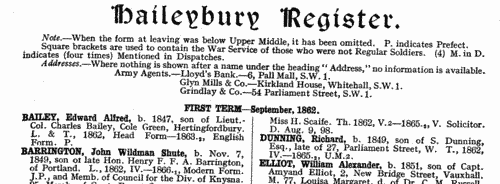
| Retired officers of the Royal Navy and the Royal Marines
(1898)
The Navy List, published by Authority, corrected to 18 December 1898, has this list of the officers on the Retired List of the Royal Navy and the Royal Marines. Each officer's surname, christian name, and any middle initial(s) is given; with rank, and date of seniority in that rank. The ranks are: A, Admiral; A E, Assistant Engineer; A F, Admiral of the Fleet; A P, Assistant Paymaster; Art E, Artificer Engineer; As Ck, Assistant Clerk; B, Boatswain; Bandr, Bandmaster Royal Marines; C, Captain; Car, Carpenter; Ch, Chaplain; Ch B, Chief Boatswain; Ch Cr, Chief Carpenter; Ch E, Chief Engineer; Ch Gr, Chief Gunner; Ch P; Paymaster-in-Chief; Ck, Clerk; Cr, Commander; D I H, Deputy Inspector-General of Hospitals and Fleets; E, Engineer; E Ins, Inspector of Machinery; F E, Fleet Engineer; F P, Fleet Paymaster; F S, Fleet Surgeon; Gr, Gunner; H Sch, Head Schoolmaster; I H, Inspector-General of Hospitals and Fleets; L, Lieutenant; Mid, Midshipman; N C, Naval Cadet; N I, Naval Instructor; P, Paymaster; R A, Rear Admiral; S, Surgeon; S C, Staff-Captain; S Cr, Staff Commander; S E, Staff Engineer; S L, Sub-Lieutenant; S P, Staff Paymaster; S S, Staff Surgeon; Schm, Schoolmaster Royal Marines; St Ma, Sergeant Major Royal Marines; V A, Vice Admiral; W O, Warrant Officer Royal Marines. PILKINGTON. Cost: £6.00.  | Sample scan, click to enlarge
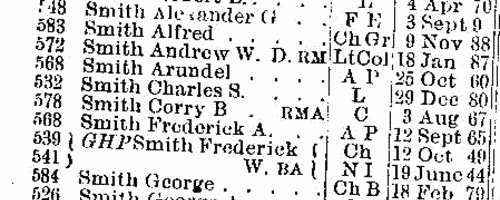
| Steam Engine Makers in England
(1898)
The report of the Steam Engine Makers Society includes accounts of disbursements by all their branches (mostly in England), covering members' sickness, travel and funeral expenses.PILKINGTON. Cost: £6.00.  | Sample scan, click to enlarge
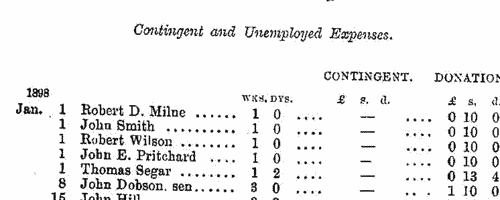
| Residents of Alma Place, Helensburgh (1899)
Street directory of Helensburgh from the 22nd edition of the Helensburgh Directory
PILKINGTON. Cost: £8.00.  | Sample scan, click to enlarge
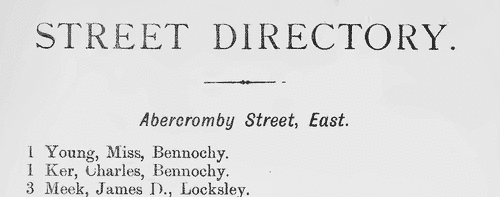
| Boys at University College School
(1860-1900)
In 1830 a school was set up adjoining the University and College of London on Gower Street; the school was enlarged from 1860 to 1876, and then removed to Frognal in 1907. In 1931 this register was published, listing all boys entering the school from Christmas term of 1859 to the summer entrants of 1931. The dates are abbreviated (98-01 = 1898-1901, &c.), each session being reckoned as beginning in September of one year and ending in the July of the next; the date of joining the school is indicated by the former, although it may fall in the latter, but the date of leaving by the latter, although it may fall in the former. Thus, if a boy came at any time during the Session 1863-64 and left any time during 1868-69, his date would be given 1863-69. The boys are listed alphabetically by surname, and then chronologically under each surname, full name being given where known. An asterisk * indicates that that particular boy lost his life in the Great War: in these cases, rank and regiment have been given where possible. Addresses as of 1931 are given where known. Italics in christian names or initials indicate that that particular boy was known, in 1931, to be dead. (a) (b) &c placed before christian names indicates brothers. In some cases occupation in later life is shown (A, artist; B, barrister; C A, chartered accountant; Ch, chemist; E, engineer; H C S, home civil service; I C S, Indian civil service; Med, physician or surgeon; M S E, member of the Stock Exchange; Mus, musician; Rev, minister of religion; S, solicitor). This is the index to those boys who were at the school in the period 1860 to 1900.PILKINGTON. Cost: £4.00.  | Sample scan, click to enlarge

| Eton College boys and masters
(1900)
Printed lists of boys attending Eton College were issued each School-Time or term. This is the list for Michaelmas School-Time, 1900. The governors and masters of the schools are given first: then the names of a scholar elected for King's in December 1899, and the names and ages of 20 scholars elected for Eton in July 1900, 12 of whom had been admitted. Winners of the Newcastle Scholarship, two each year, back to 1829, and of the various college scholarships and prizes for 1899, precede the Distinctions in Trials (examinations) for July 1900. The First Hundred and Certificate examination list for Election 1900 list the boys in order of merit and with the marks awarded in Classics, Mathematics, Scripture Knowledge and History. The Certificate list is divided into First, Second and Third Classes, Passed, and Failed. The names of examiners and absentees are also given. Then follow the main lists of all the pupils, arranged by class. For every boy his position in class, surname, house tutor's name and classical tutor's name, are given; and evey boy's entry is annotated with details of his prizes during his whole period at the school. In the fifth forms the list for each class is divided into four parts, divided by a dotted line, then a wavy line, and then a full line. The top fourth had all obtained distinction in the last trials; those above the wavy line had been classed in the last trials; next were the unclassed; and below the full line were those boys who had failed in the trials.
PILKINGTON. Cost: £6.00.  | Sample scan, click to enlarge
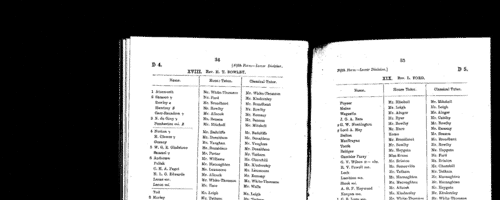
| Eton College boys and masters
(1900)
Printed lists of boys attending Eton College were issued each School-Time or term. This is the list for Midsummer School-Time, 1900. The governors and masters of the schools are given first: then the names of a scholar elected for King's in December 1899, and the names and ages of 16 scholars elected for Eton in July 1899, 15 of whom had been admitted. Winners of the Newcastle Scholarship, two each year, back to 1829, and of the various college scholarships and prizes for 1899 and 1900, precede the Distinctions in Trials (examinations) for March 1900. The First Hundred and Certificate examination list for Election 1899 list the boys in order of merit and with the marks awarded in Classics, Mathematics, Scripture Knowledge and History. The Certificate list is divided into First, Second and Third Classes, Passed, and Failed. The names of examiners and absentees are also given. Then follow the main lists of all the pupils, arranged by class. For every boy his position in class, surname, house tutor's name and classical tutor's name, are given; and evey boy's entry is annotated with details of his prizes during his whole period at the school. In the fifth forms the list for each class is divided into four parts, divided by a dotted line, then a wavy line, and then a full line. The top fourth had all obtained distinction in the last trials; those above the wavy line had been classed in the last trials; next were the unclassed; and below the full line were those boys who had failed in the trials.
PILKINGTON. Cost: £6.00.  | Sample scan, click to enlarge
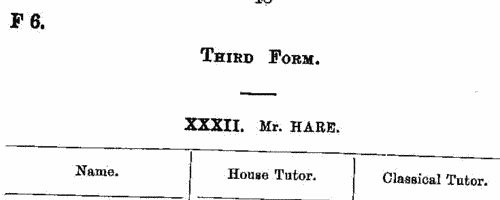
| Eton College boys and masters
(1900)
Printed lists of boys attending Eton College were issued each School-Time or term. This is the list for Lent School-Time, 1900. The governors and masters of the schools are given first: then the names of a scholar elected for King's in December 1899, and the names and ages of 16 scholars elected for Eton in July 1899, 12 of whom had been admitted. Winners of the Newcastle Scholarship, two each year, back to 1829 (here indexed from 1859 onwards), and of the various college scholarships and prizes for 1899, precede the Distinctions in Trials (examinations) for December 1899. The First Hundred and Certificate examination list for Election 1899 list the boys in order of merit and with the marks awarded in Classics, Mathematics, Scripture Knowledge and History. The Certificate list is divided into First, Second and Third Classes, Passed, and Failed. The names of examiners and absentees are also given. Then follow the main lists of all the pupils, arranged by class. For every boy his position in class, surname, house tutor's name and classical tutor's name, are given; and evey boy's entry is annotated with details of his prizes during his whole period at the school. In the fifth forms the list for each class is divided into four parts, divided by a dotted line, then a wavy line, and then a full line. The top fourth had all obtained distinction in the last trials; those above the wavy line had been classed in the last trials; next were the unclassed; and below the full line were those boys who had failed in the trials.
PILKINGTON. Cost: £6.00.  | Sample scan, click to enlarge
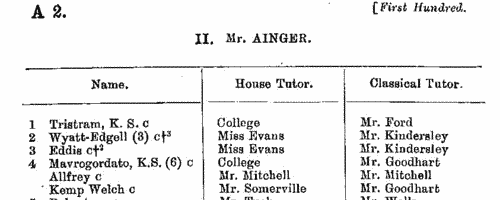
| Unclaimed Naval Prize Money
(1855-1902)
Various prize moneys were awarded to officers and men who served on board her Majesty's ships. For one reason or another a substantial number of these prizes, from as little as a shilling or two to as much as many pounds, remained undistributed by 1902, when this comprehensive list of the unclaimed moneys was printed: it lists unclaimed shares of prize money, slave and pirate bounties, salvage awards, parliamentary grants, gratuities and other moneys distributed by the Admiralty 1855 to 1902, but which omits moneys for service on the China Station during the war of 1856 to 1880, and special gratuities for service in Egypt (1882), Soudan (1884) and Soudan and Nile Expedition (1884-1885), for which there are separate indexes. In each case the sailor's name is given first (surname, then christian name or initials); rank or rating; ship in which serving at time of capture or award; and the amount due.PILKINGTON. Cost: £6.00.  | Sample scan, click to enlarge

|  British artillerymen fighting in South Africa
(1899-1902) British artillerymen fighting in South Africa
(1899-1902)
The Queen Victoria's South Africa Medal was awarded (after her death, in the event) to all who had served honourably in the various campaigns in the Boer War. Returns were made from each unit, and consolidated into nominal roll, of which this is the one for the Royal Artillery. Confusingly, the ledgers used had originally been printed for a register of men transferred (or re-transferred after mobilization) to 1st Class Army Reserve. All the original column headings were therefore struck through, and the roll was prepared with this information: Date of Issue; Regimental Number; Rank; Name; Unit; Medal (a 1 indicating that a medal was awarded); [number of] Clasps; the reference to the source in the original returns, usually starting with AG for papers in the hands of the Adjutant-General, and 68/Art/ for the Royal Artillery records. The final column, normally left blank, was occasionally used for explanatory remarks.PILKINGTON. Cost: £8.00.  | Sample scan, click to enlarge
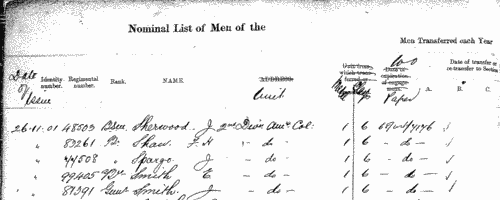
|
Research your ancestry, family history, genealogy and one-name study by direct access to original records and archives indexed by surname.
|













